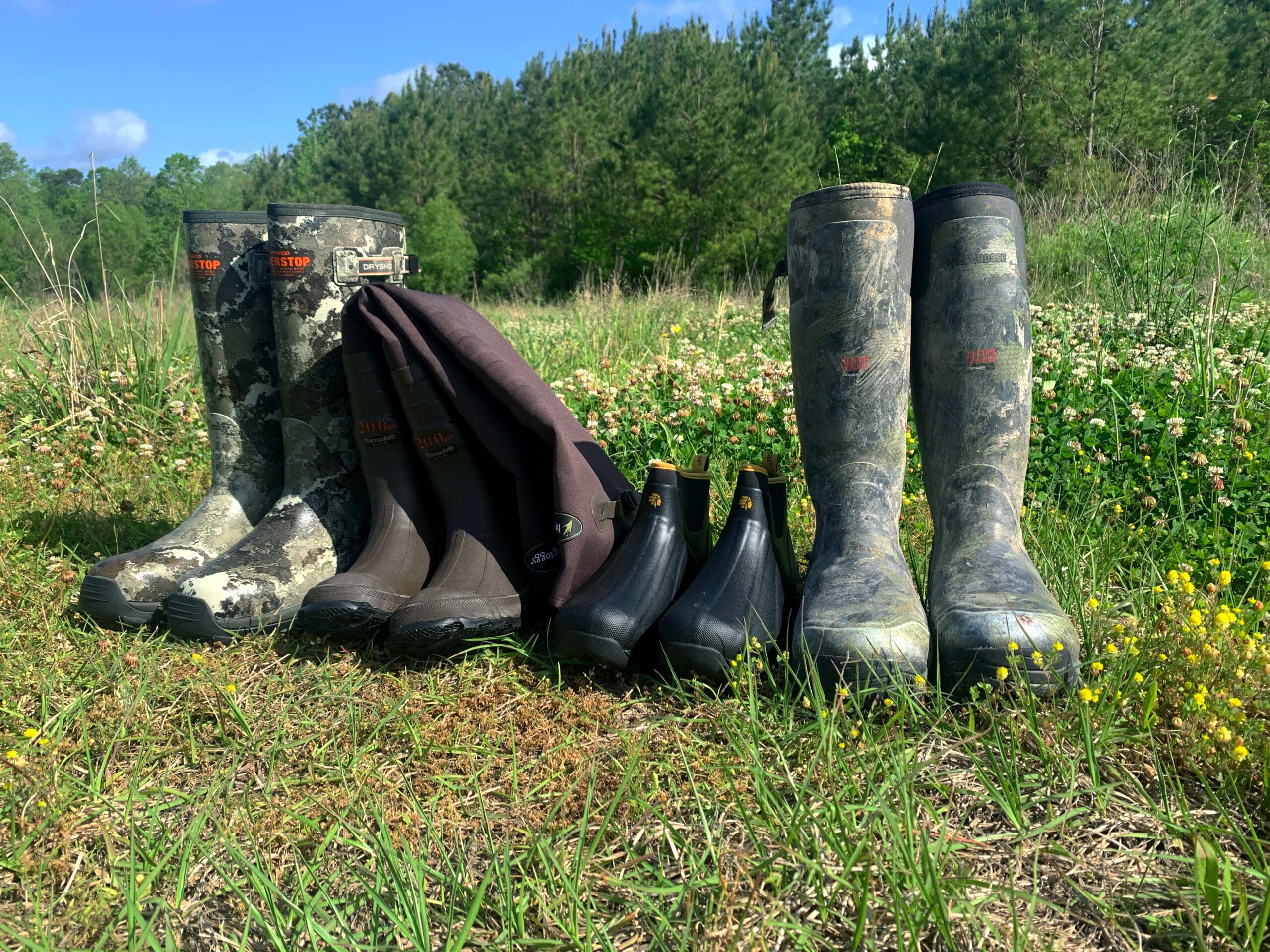We may earn revenue from the products available on this page and participate in affiliate programs. Learn More ›
From whitetail to frogs and everything in between, rubber hunting boots serve a variety of needs, depending on what game you chase. I’ve worn several different brands throughout the years, but the best ones typically provide the right amount of warmth, traction, and breathability. Whitetail hunters typically need a breathable, insulated boot that won’t leave your feet soaking wet from your walk to the stand but can keep you warm on frigid all day sits.
When turkey season rolls around, a lightweight snake boot that wicks moisture and keeps your feet cool and dry during run-n-gun sessions works best. And while there might not be one rubber boot that excels at every temperature range and hunting scenario, there are options that come close. Just know there’s some give and take if that’s what you want. Otherwise, you’ll have to invest in a few pairs if you want the best rubber hunting boots for specific hunting seasons and strategies.
Things to Consider When Buying Rubber Hunting Boots
Insulation
Most manufacturers offer rubber hunting boots with different insulation levels. Numbers like 200g, 800g, 1200g, etc. all refer to the thickness of insulation in a boot. The higher the number, the thicker the insulation. Boots with higher levels like 1200g or 1600g typically function best for frigid, stationary hunts, whereas boots with 200g or 400g ratings are better suited for early or spring season hunts, or if you do a lot of mobile/spot-and-stalk hunting.
Terrain
Obviously, if you’re looking for a rubber hunting boot your main concern probably deals with water or scent control, but you should also consider the landscape you’ll frequent as well. If you just want something that will keep the dew off your feet as you walk through open pastures, traction probably isn’t a priority. But if you cross creeks and steep banks on the way to your honey hole, solid traction can make your early walk-ins a lot less slippery. Also consider a snake boot if you hunt the deep south and early or spring seasons.
Overall Fit
If you’ve ever owned a pair of rubber boots that were too big, then you know the headache of your upper slapping against your leg as you try to silently walk to your stand. On the flip side, it’s almost easier to cut off a rubber boot that fits too snug than it is to remove it, and this can create rather than prevent blisters. But not having properly sized boots isn’t just annoying, it can quickly derail your enjoyment in the woods. It’s best to try on boots before you buy them, and consider how or if you plan to layer in them.
Socks
This might seem like a no-brainer or maybe it doesn’t, but even the best boots in the world won’t do you any good if you’re not wearing the right socks. If you throw on the first pair of Hanes you blindly grab from your drawer and expect your feet not to freeze even in a heavily insulated boot, you’re in for a long, cold sit. Wear a cheap pair of cotton socks while you’re slogging through the wet timber during turkey season, and you’ll likely go home with more blisters than filled tags. Most companies and websites recommend socks to pair with certain boots, so when you’re dropping the cash on a new pair, go ahead and shell out the extra on a good pair of hunting socks.
Best Rubber Hunting Boots: Reviews & Recommendations
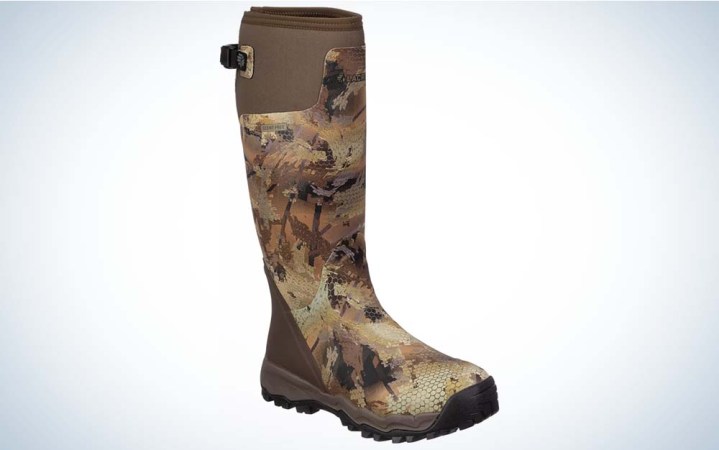
See It
Key Features
- Adjustable neoprene gusset
- Multiple camo and color patterns
- Height: 18 inches
- Weight: 5.2 pounds
- Mild, cold, and arctic insulation options
- Scent-free rubber
Pros
- Durable
- Comfortable
- Doesn’t feel as bulky as others
- True to size
Cons
Most rubber boots serve their main purpose, which is to keep your feet dry, but that’s about it. The Alpha Burly Pros do this and have the best qualities of a solid hunting boot. Cheaper rubber boots, even in your right size, still have extra room at the heel, which causes it to slip, especially if you’re walking through thick mud. I’ve clean come out of a rubber boot while doing so. But the Alpha Burly Pros have a snug fit, and there’s no space between your heel and the back of the boot for your foot to slip out. I hunted out of a pair of Burlys I inherited from my dad and got years out of them before I had to buy new ones. And the Alpha Burly Pros are just as, if not more, rugged.
I mainly use these for late season deer but also sometimes during turkey season, and if you’re a die-hard whitetail hunter, you probably shuddered at that last statement. These boots excel in a variety of hunting situations, though most notably for whitetail. But if you get the right insulation, you can have yourself an awesome do-it-all rubber boot.
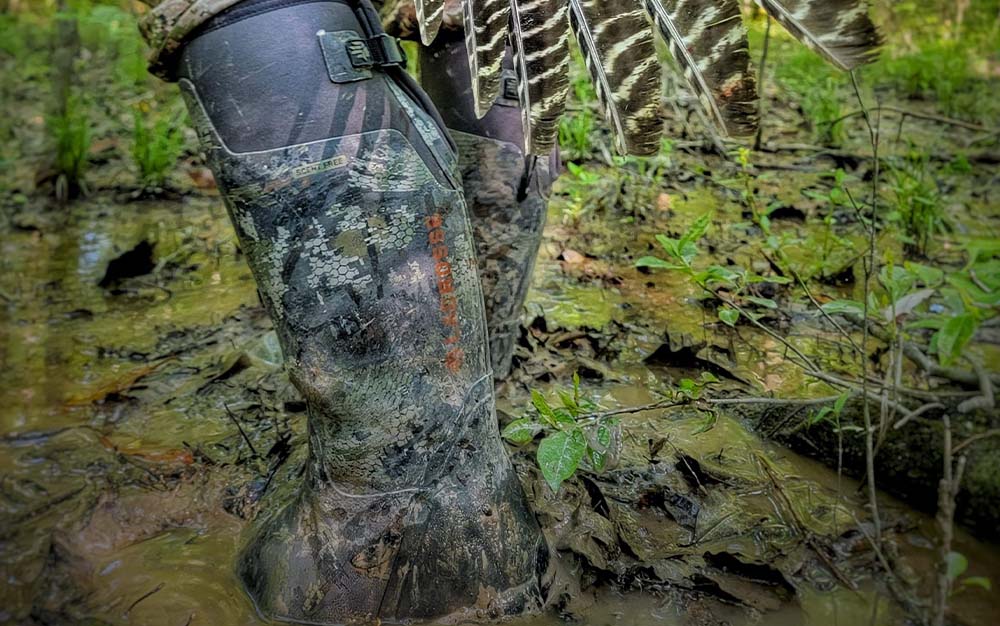
My Alpha Burly Pros have the 800g insulation, which Lacrosse specifies as their Cold rating. And these get plenty warm. During the coldest days of deer season, I typically run a liner and some kind of wool sock. If I’m hunting from a stand that doesn’t require a ton of walking, my feet might still get a tad cold from time to time but not numb-can’t-feel-my-toes cold. These boots are all around comfortable, and I don’t mind putting some distance on them. But if the hike to your stand is more than a mile, prepare for your feet to get steamy, especially in the early season.
Still, with the right socks, you can use these in a wide range of temps or hunting seasons. And this might not be an issue if you have the uninsulated 3.5mm neoprenes, but if you plan on putting some miles on these boots, consider the uninsulated ones and pack an extra pair of socks for when you get to your stand. If there’s any drawback to these boots, it’s that the latch on the adjustable gusset sometimes works too well and doesn’t want to come free.
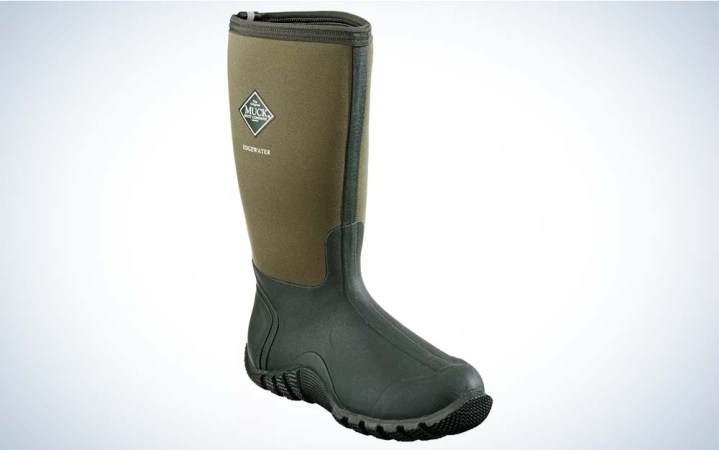
See It
Key Features
- Temperature rating: sub-freezing to 85 degrees
- 5mm neoprene
- Two color options
- Weight: 2 pounds
- Stretch-fit upper
Pros
- Easy to put on
- Comfortable
- Available almost anywhere
- Breathable
Cons
- Not as warm as other options
- Upper soaks rather than sheds water
Besides LaCrosse, Muck Edgewaters are probably synonymous with rubber boots. You can find them everywhere from your local co-op to high-end shoe departments. These boots won’t keep you the warmest in below freezing temps (even though they’re supposedly rated for it), but they’ll get the job done in a pinch. Throughout high school, I’d wear these boots from the garden to the deer stand and everywhere in between. There’s no adjustable gusset, so make sure you get the right size, and these boots do run a little big. The traction on the Edgewater soles doesn’t perform well in especially muddy terrain. I tried climbing a ladder stand after walking through mud, and the lack of traction made it particularly slippery compared to other brands.
For most of the country, these make great budget rubber boots for the early season. I’ve worn these on opening day in Mississippi where temps sometimes hit 90 degrees, and they offer plenty of breathability. However, if conditions are especially wet, the uppers on the Edgewaters tend to soak instead of shed water. But if you want a boot that’ll get the job done on a budget and has versatility, these are the way to go.
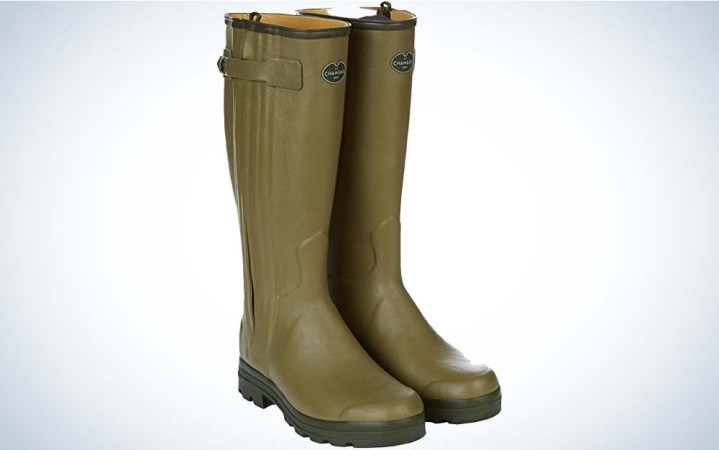
See It
Key Features
- Full-grain leather lining
- Side zipper and tightening strap
- Height: 17 inches
- Weight: 2.7 pounds per boot
- Sizing for foot length and calf circumference
- Comfortable leather insoles
Pros
- Sizing and design offers an almost custom fit
- Zipper allows for easy on and off
- Highly durable
- Grippy tread
Cons
Product Description
These are the most comfortable and form fitting rubber boots money can buy. Le Chameau is an almost century-old French company that makes their Chassuer rubber boots by hand. If that sounds expensive, well, it is. This pair of boots costs about as much as a new pump-action shotgun. But for the money, you get the most comfortable, form-fitting rubber hunting boot on the market. Le Chameau sizing options account for your calf size, so you can be sure to order a boot that fits you perfectly.
The side zipper and tightening strap make for a secure fit when you’re walking long miles. And the leather insole and lining keep your feet and legs from getting clammy or cold. I’ve worn these boots for countless miles chasing turkeys, pheasants, early-season whitetails, and even blacktail deer in the mountains of Southeast Alaska. I can’t imagine wearing a different brand of rubber boot on a true mountain hunt. The Le Chameau Chasseurs have held up to the years of abuse and are still as waterproof as the day I got them. I hope to see at least eight to 10 good years out of these boots, in which time I probably would have burned through two or three pairs of lesser boots. —Alex Robinson, editor-in-chief
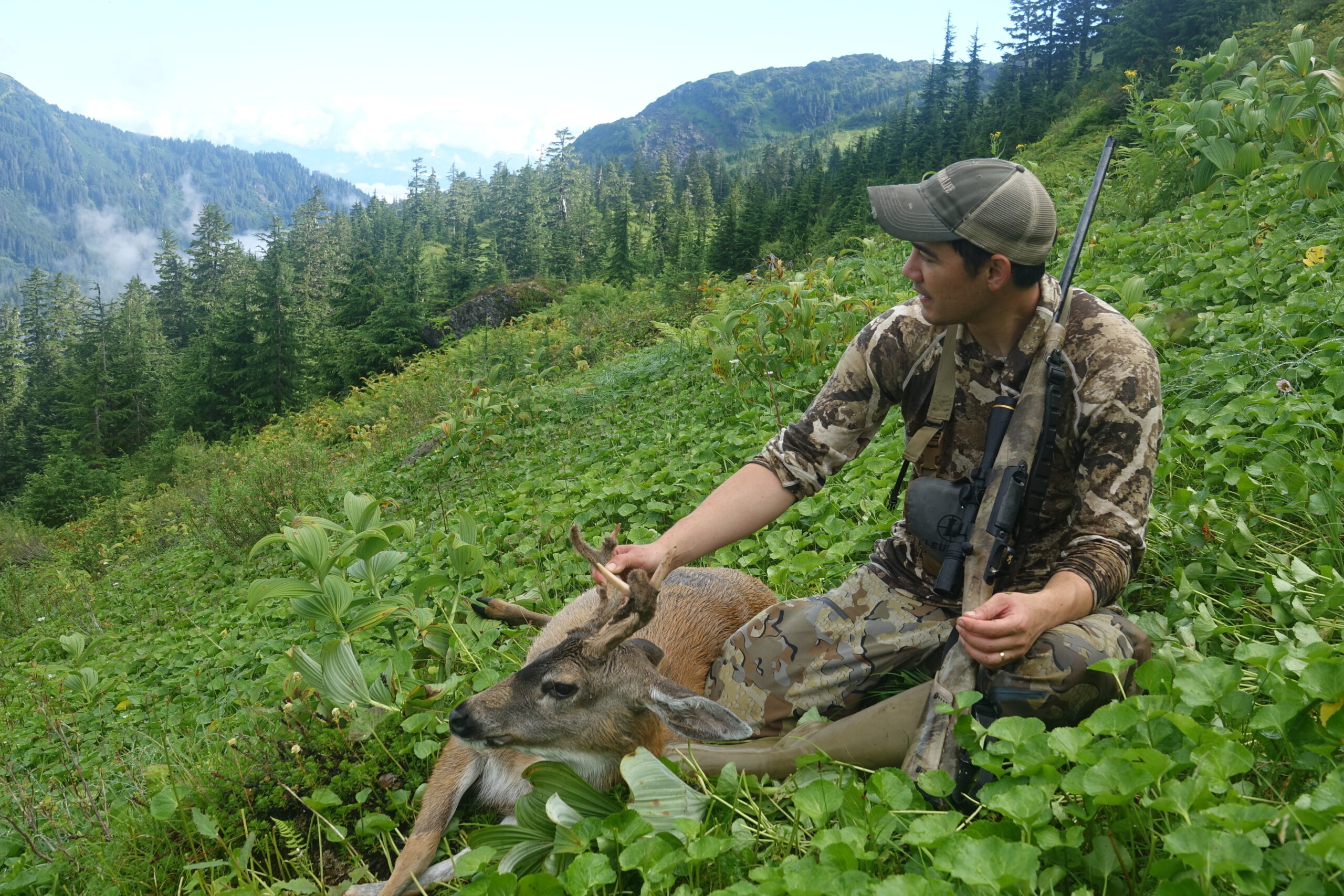
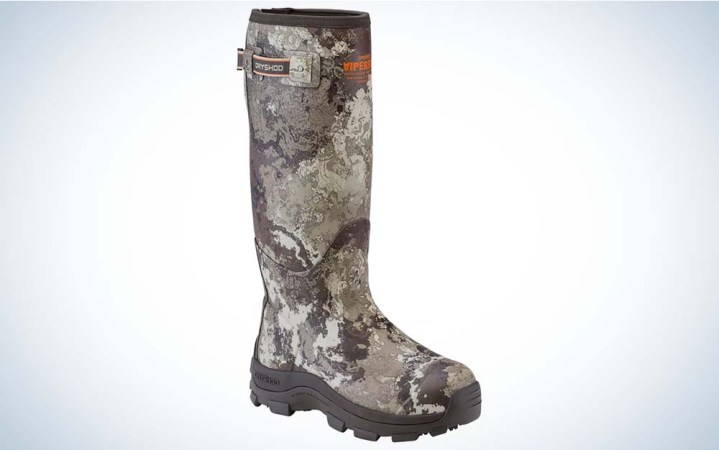
See It
Key Features
- 100 percent waterproof
- Hydrokote water repellent
- 5mm Desoprene insulated boot
- Back-pull tabs
- WIXIT Cool-Clad airmesh
Pros
- 2 inches taller than all other Dryshod models
- Keeps feet cool
- Easy on and off
- Sheds water
- Great for turkey or early season hunts
Cons
- Not the best for cold temps
If you spend most of your spring mornings chasing turkeys, especially in the south, you probably see you fair share of snakes. The Dryshod ViperStops not only keep your feet dry from spring rains, but they also help prevent snake bites in the turkey woods. And the VEIL camo pattern looks pretty sweet, too.
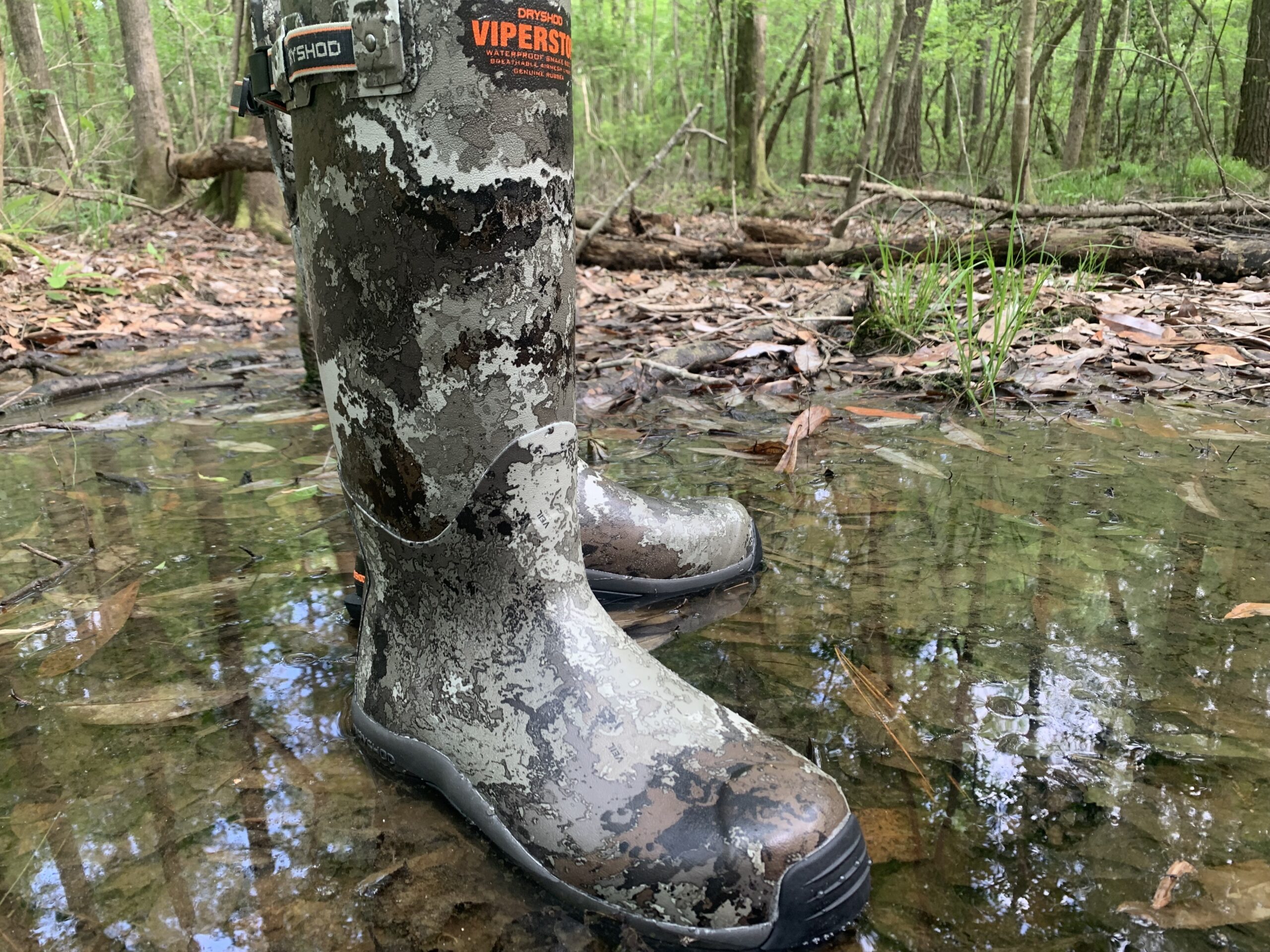
I tested these during turkey season this year, and the 5mm Desoprene insulation will keep you warm during the early part of turkey season when cool mornings still linger, but they didn’t run too hot when spring actually showed up. Though I wasn’t lucky enough to have a snake strike these, the uppers on the ViperStops are more than convincing. These boots fit true to size, and the traction on the out soles works great. I crossed a couple of steep creek banks after a week of showers, and these boots had some of the best traction, right up there with the Alpha Burly Pros, out of all the boots I tested. While a lot of rubber boots feel stiff out of the box, the ViperStops required a minimal break-in period, and I didn’t have any irritation or discomfort the first time I wore them on an all-day turkey hunt.
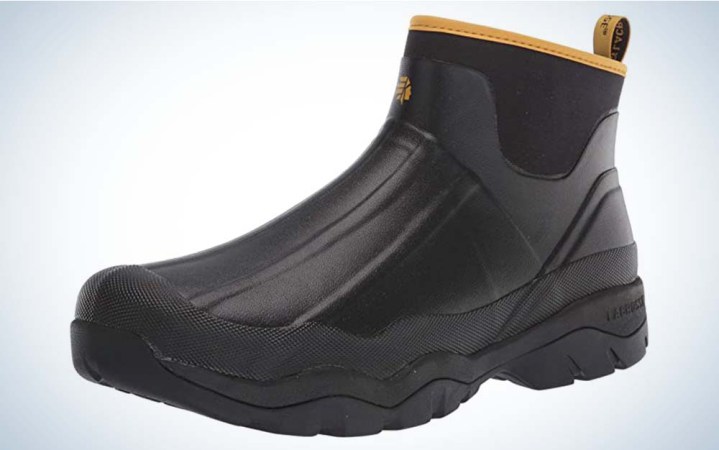
See It
Key Features
- 3mm neoprene
- Black or Stone color options
- Weight: 4.3 pounds
- Temperature rating: mild
- Waterproof
Pros
- True fit
- Durable
- Keeps feet dry but cool
- Multiple uses
- Great moisture wicking
Cons
- Feels a bit heavy for slip-ons
One day as I drove by a property I have permission to turkey hunt, I noticed a gobbler strutting along the back corner of the field. If it weren’t for the oncoming traffic, I probably would have busted an instant U-turn. But I quickly parked, threw on my camo, and slipped through the overgrown part of the field. While I didn’t care at the time, it rained the night before, and by the time the hunt ended, my feet were bone-soaked. These slip-ons would have been perfect.
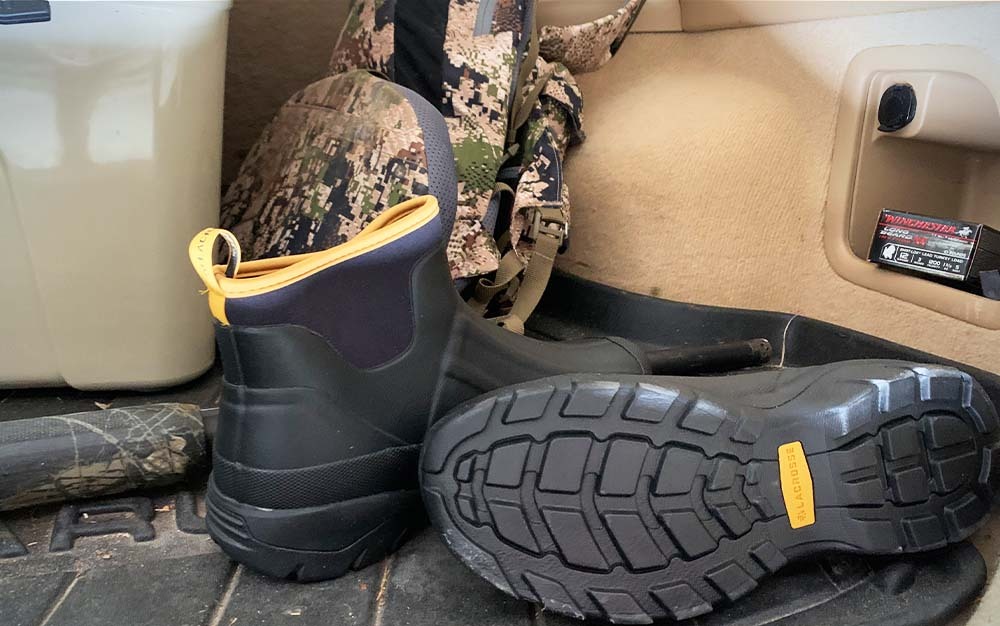
Now that I have a pair, I keep them in the back of my car for quick scouting trips and those sporadic, head-turning moments when I need to go from casual to camo at a moment’s notice. And they’re perfect for turkey season when spring showers occur as much as gobbles. But I also wouldn’t count them out for other seasons as well. You don’t get the traction of the Alpha Burly Pros, but these are still better than most. The 3mm neoprene isn’t too hot for this time of year either. And just because hunting season ends, doesn’t mean these boots have to go in the garage. Their versatility makes them even more appealing. Slip them on for those dewy mornings in the garden or dress them up on a rainy date night.

See It
Key Features
- 100 percent waterproof
- 1200-gram Thinsulate
- Removable 5mm wool felt insole
- Sizes: women’s 6-11
- Adjustable gusset
- Shin guard overlay
Pros
- Super warm
- Not as bulky as other options
- Excellent moisture wicking
- Plenty of traction
Cons
Women looking for a warm, true-to-fit rubber hunting boot will be pleased with the DSG 1200gs. My wife tested these boots—her feet tend to run cold no matter what type of boot she wears—and found these to provide more than enough warmth. She ordered a size 9, her typical boot size, and they fit perfectly. And these boots don’t feel heavy or have unnecessary bulk like other rubber boots, which my wife noted as one of her favorite things about these.
She also didn’t have any problem climbing a ladder stand in wet conditions, thanks to the traction on the outsoles and found them especially breathable even while she tested them in mild spring conditions. While she doesn’t mind the lack of camo options, others might prefer it. You’ll have to sacrifice some insulation if you want a camo pair of DSGs, which they offer in Realtree Edge but only with 400g 3M Thinsulate.
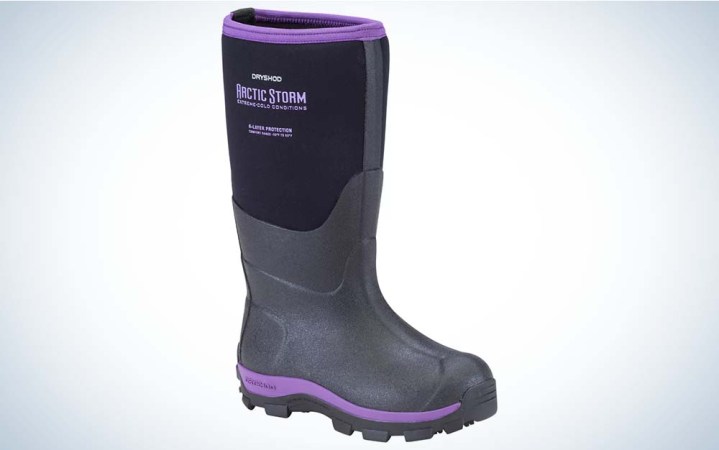
See It
Key Features
- 5mm Desoprene
- Back pull tabs
- Six layers of insulation
- Sizes: Children’s 10-13, youth 1-6
Pros
- Lots of warmth
- Easy on-off
- Kid-durable
Cons
- Kids will likely outgrow them fast
If there’s anything that ends a youth hunt quicker, it’s the cold, and feet are usually the first casualties. Most kid/youth hunts involve blind or shooting house sits that probably don’t require a lot of walking. The Arctic Storms will keep your kid’s feet warm, especially with a good pair of wool socks. And they’re easy to pull on/off when your half-asleep child is trying their best to layer up before dawn. My kid brother has a pair of these and wears them rabbit, squirrel, and deer hunting but also on during the summer when he bass fishes the neighbors’ farm pond.
At just over $100, the price tag might seem a bit steep, especially since kids change sizes overnight. And if you’re in the market for a pair of boots for a kid that’s a first-time hunter, there are cheaper options that will do just fine, especially if they don’t immediately catch the hunting bug. But if you have a kid or relative who tries to spend every waking moment outdoors, the Arctic Storms can withstand anything they’ll put them through.
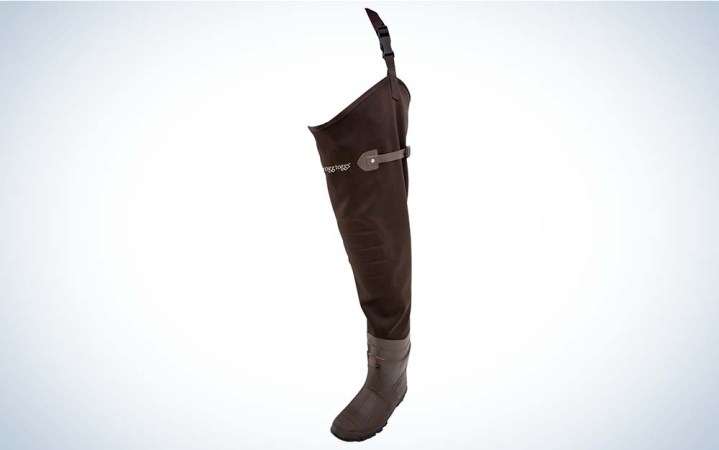
See It
Key Features
- 200-gram Thinsulate
- Adjustable belt leashes and side straps
- Cleated outsole
- Padded knees
- 100 percent waterproof
Pros
- Lightweight
- Breathable
- Budget friendly
- Packable
Cons
- Not the best for super cold temps
- Waders available at a similar price point
Versatility alone makes the Cascades worth including on this list, not to mention the bargain price point. While frogg toggs designed these hip boots for fly fishing, they’re also an affordable option for duck hunting (in places that aren’t too deep) or sneaking up on elusive swamp bucks. I deer hunt several places where I have to cross creeks, and depending on the time of the year, regular rubber boots won’t cut it. But with the Cascades, this isn’t a problem. They’re lightweight enough that you can pack them for when you need to cross a creek (though they take up a lot of room on/in a pack) or comfortable enough to wear them for your entire hunt, and they can even double as an extra layer.
The 200-gram insulation works great for the early season or deep south hunters, but they’re probably not the best for freezing or sub-freezing temps, especially for duck hunters. And while the $110 price tag is a bargain, Frogg Toggs offers full blown waders for just $20 more. I had the privilege of testing a free pair, but if I had to buy them myself, I’m dropping the extra $20. Still, these hip boots are a fantastic option for JIC moments, or if you plan to rarely use them but still want a durable pair of hippers.
Best Run-N-Gun Rubber Boot: Chene Light Knee Boot
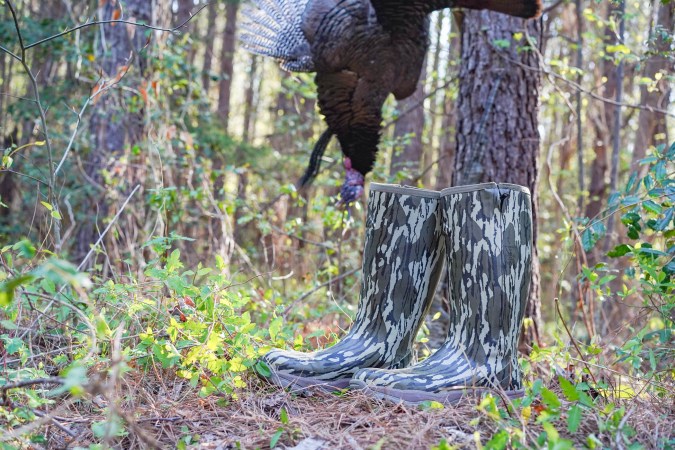
See It
Key Features
- Natural rubber and neoprene
- Insulated
- Includes 7mm insoles
- YKK zipper
- Men’s Sizes: 6 to 14
- Colors: Brown, Olive, Mossy Oak Bottomland, Mossy Oak Original Treestand
- Price: $200
Pros
- Stable
- Light with good ground feel
- Good moisture wicking
Cons
I’ve cursed many rubber boots because their accolades stopped at their waterproof quality. Most were heavy, cumbersome sweat traps. Yet, I’ve finally found a nimble, supportive, and easy-to-take-off rubber boot that’s ideal for sneaking through the woods: the Chene Light Zippered Knee Boot. This boot also comes in Bottomland, so you know it’s ready to turkey hunt.
I’ve been hunting, and killing, turkeys in the swamps of Virginia and the hills of Indiana with my Chene Light Zippered Knee Boots. My feet are dry from creek crossings and comfortable after chasing gobbles for miles up and down ridges. On my feet the Chene Knee Boots feel like a hiking shoe. There’s noticeable support around the ankle. From the ankle up they’re much like a traditional rubber boot, but they have a zipper down the side which makes taking them off much easier. —Scott Einsmann
How to Choose a Rubber Hunting Boot
Weather, terrain, and hunting conditions along with what you want from a rubber hunting boot should inform your purchase. If you’re a die-hard whitetail hunter and you want the best rubber hunting boots strictly for that purpose, you need something, like the Alpha Burly Pros that will keep you warm during all-day sits but still wick moisture and keep your scent to a minimum.
However, if you’re on a budget or just want a boot you can wear to the deer stand or for small game hunts, the Muck Edgewaters offer a versatile and affordable option. Just don’t expect an uninsulated rubber boot to keep you warm like one with 1600g of Thinsulate insulation will. On the other hand, don’t be surprised when you sweat your socks off in those same heavily insulated boots when you decide to run-n-gun on an all-day turkey hunt in them. There’s nothing worse than discovering that your rubber boot is too hot or too cold when you’re in the middle of a hunt.
Read Next: The Best Hunting Boots of 2023
FAQs
In my opinion, LaCrosse makes the best rubber boots for the money. I’ve used them for years without any real complaints or issues. I find that they run true to size and typically live up to their insulation ratings if you wear the proper socks. And they make some of the most durable boots I’ve ever owned.
Depending on your care, maintenance, and use, you can get several years out of a good pair of rubber hunting boots. During high school, I put a hand-me-down pair of Burlys through the wringer without proper boot care and still got years out of them. Just about every company offers a rubber boot conditioner that you can apply to help keep them sealed, which is important if you use them regularly.
Unless you find that a company’s boots run small, you shouldn’t buy a whole size bigger hunting boot. When it comes to rubber hunting boots specifically, you’ll likely get blisters if your foot has extra room to slide around. The extra space also makes it easy for air to get in and decrease the boot’s warmth. Some people buy a size bigger and plan to layer with extra socks, but if you have the right socks for your boots this shouldn’t be an issue.
Final Thoughts
The best rubber hunting boots should keep you dry and warm above all, but some offer extra features that make hunting that much more enjoyable. Make sure you check off those first two factors, and then decide which additional ones can maximize your enjoyment or experience in the woods.
Read the full article here

